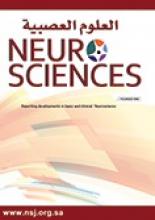Abstract
Objectives: To quantify the extent and variation of depression, anxiety and stress among medical and non-medical Saudi Arabian students.
Methods: In this cross-sectional study, students from Umm Al-Qura University, Makkah, Saudi Arabia, were recruited. The Faculty of Education was randomly selected to represent the non-medical colleges. The depression, anxiety and stress scale-21 items (DASS-21) was used to estimate the study outcomes.
Results: Of the 465 undergraduates recruited in this study, 49.68% (n=231) were medical students and 50.32% (n=234) were non-medical students. Approximately 54%, 53%, and 38% of the participants were found to be suffering from depression, anxiety, and stress, respectively. The analyses showed that the two groups did not differ significantly with respect to stress and depression (p=0.934 and 0.423, respectively). However, the non-medical students exhibited a significantly higher anxiety score compared to the medical students (p=0.002). Family conflicts was a common risk factor for the studied psychological disturbances. Female gender and travel time from home to university were significant predictors of depression and anxiety, whereas a positive history of a psychological condition increased the likelihood of depression and stress.
Conclusion: There was a high prevalence of anxiety, stress, and depression among the students, with a significantly higher anxiety levels among the non-medical students.
Footnotes
Disclosure. Authors have no conflict of interests, and the work was not supported or funded by any drug company.
- Received August 16, 2020.
- Accepted October 19, 2020.
- Copyright: © Neurosciences
Neurosciences is an Open Access journal and articles published are distributed under the terms of the Creative Commons Attribution-NonCommercial License (CC BY-NC). Readers may copy, distribute, and display the work for non-commercial purposes with the proper citation of the original work.






